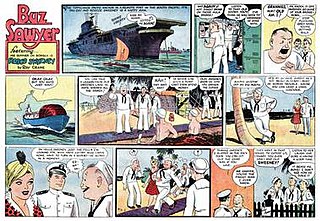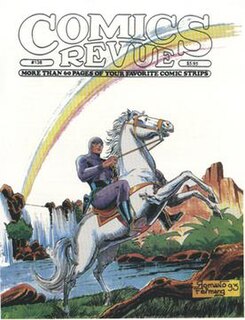
Casey Ruggles is a Western comic strip written and drawn by Warren Tufts that ran from May 22, 1949 to October 30, 1955. [1]

Casey Ruggles is a Western comic strip written and drawn by Warren Tufts that ran from May 22, 1949 to October 30, 1955. [1]
The Sunday strip was launched May 22, 1949, and the daily strip on September 19, 1949. [2] Until 1950, the Sunday strip and the daily strip both told the same story.
Tufts' ghost artists and assistants were Al Plastino, Edmond Good, Alex Toth and Ruben Moreira. [2] Tufts did not write or draw the Sunday strip between August 31, 1953, and January 30, 1954. The last Tufts' daily was April 3, 1954, and his last Sunday was on September 5, 1954. [3]
The strip continued for a short while with Al Carreño as artist and writer. [2]
Casey Ruggles was an Old West adventurer in California during the Gold Rush. A former sergeant in the U.S. Army, he encountered such historical figures as Kit Carson, William G. Fargo, Millard Fillmore, Jean Lafitte, and Henry Wells. [2]


All of the daily stories by Warren Tufts have been reprinted by Pacific Comics Club or Comics Revue . Comics Revue has also reprinted all of the Sunday's by Warren Tufts through 7 JUNE 1953. The early dailies and Sundays have been reprinted in hardback by Classic Comics Press; two more volumes are planned.
Disney comics are comic books and comic strips featuring characters created by the Walt Disney Company, including Mickey Mouse, Donald Duck and Uncle Scrooge.

The Phantom is an American adventure comic strip, first published by Lee Falk in February 1936. The main character, the Phantom, is a fictional costumed crime-fighter who operates from the fictional African country of Bangalla. The character has been adapted for television, film and video games.

Red Ryder was a Western comic strip created by Stephen Slesinger and artist Fred Harman which served as the basis for a wide array of character merchandising. Syndicated by Newspaper Enterprise Association, the strip ran from Sunday, November 6, 1938, through 1965.

Quality Comics was an American comic book publishing company which operated from 1937 to 1956 and was a creative, influential force in what historians and fans call the Golden Age of Comic Books.

Steve Canyon was an American adventure comic strip by writer-artist Milton Caniff. Launched shortly after Caniff retired from his previous strip, Terry and the Pirates, Steve Canyon ran from January 13, 1947, until June 4, 1988. It ended shortly after Caniff's death. Caniff won the Reuben Award for the strip in 1971.

Alexander Toth was an American cartoonist active from the 1940s through the 1980s. Toth's work began in the American comic book industry, but he is also known for his animation designs for Hanna-Barbera throughout the 1960s and 1970s. His work included Super Friends, Fantastic Four, Space Ghost, Sealab 2020, The Herculoids and Birdman. Toth's work has been resurrected in the late-night, adult-themed spin-offs on Cartoon Network: Space Ghost Coast to Coast, Sealab 2021 and Harvey Birdman, Attorney at Law.

Buz Sawyer is a comic strip created by Roy Crane. Distributed by King Features Syndicate, it had a run from November 1, 1943 to October 7, 1989. The last strip signed by Crane was dated 21 April 1979.

Comics Revue is a bi-monthly small press comic book published by Manuscript Press and edited by Rick Norwood. Don Markstein edited the publication from 1984 to 1987 and 1992 to 1996.
Michael Anglo was a British comic book writer, editor and artist, as well as an author. He is best known for creating the superhero Marvelman, later known as Miracleman.
United Feature Syndicate is a large American editorial column and comic strip newspaper syndication service based in the United States and established in 1919. Originally part of E. W. Scripps Company, it was part of United Media from 1978 to 2011, and is now a division of Andrews McMeel Syndication. United Features has syndicated many notable comic strips, including Peanuts, Garfield, Li'l Abner, Dilbert, Nancy, and Marmaduke.

Chester Warren Tufts, best known as Warren Tufts, was an American comic strip and comic book artist-writer best known for his syndicated Western adventure strip Casey Ruggles, which ran from 1949 to 1954.

Lance was an American comic strip notable as the last of the full-page strips. Created and self-syndicated by artist Warren Tufts, it ran from June 5, 1955 to May 29, 1960.

Atlas Comics is the 1950s comic-book publishing label that evolved into Marvel Comics. Magazine and paperback novel publisher Martin Goodman, whose business strategy involved having a multitude of corporate entities, used Atlas as the umbrella name for his comic-book division during this time. Atlas evolved out of Goodman's 1940s comic-book division, Timely Comics, and was located on the 14th floor of the Empire State Building. This company is distinct from the 1970s comic-book company, also founded by Goodman, that is known as Atlas/Seaboard Comics.

Brick Bradford was a science fiction comic strip created by writer William Ritt, a journalist based in Cleveland, and artist Clarence Gray. It was first distributed on August 21, 1933 by Central Press Association, a subsidiary of King Features Syndicate which specialized in producing material for small-town newspapers.

Jungle Jim is the fictional hero of a series of jungle adventures in various media. The series began on January 7, 1934 as an American newspaper comic strip chronicling the adventures of Asia-based hunter Jim Bradley, who was nicknamed Jungle Jim. The character also trekked through radio, film, comic book and television adaptations. Notable was a series of films and television episodes in which Johnny Weissmuller portrayed the safari-suit wearing character, after hanging up his Tarzan loincloth. The strip concluded on August 8, 1954.
Notable events of 1949 in comics. See also List of years in comics.

Tarzan, a fictional character created by Edgar Rice Burroughs, first appeared in the 1912 novel Tarzan of the Apes, and then in 23 sequels. The character proved immensely popular and quickly made the jump to other media, including comics.
Ruben Moreira was a Puerto Rican comic book artist and writer best known for his work on Tarzan and as a DC Comics artist.
Toby Press was an American comic-book company that published from 1949 to 1955. Founded by Elliott Caplin, brother of cartoonist Al Capp and himself an established comic strip writer, the company published reprints of Capp's Li'l Abner strip; licensed-character comics starring such film and animated cartoon properties as John Wayne and Felix the Cat; and original conceptions, including romance, war, Western, and adventure comics. Some of its comics were published under the imprint Minoan. Some covers bore the logo ANC, standing for American News Company, at the time the country's largest newsstand distributor.

Western comics is a comics genre usually depicting the American Old West frontier and typically set during the late nineteenth century. The term is generally associated with an American comic books genre published from the late 1940s through the 1950s. Western comics of the period typically featured dramatic scripts about cowboys, gunfighters, lawmen, bounty hunters, outlaws, and Native Americans. Accompanying artwork depicted a rural America populated with such iconic images as guns, cowboy hats, vests, horses, saloons, ranches, and deserts, contemporaneous with the setting.